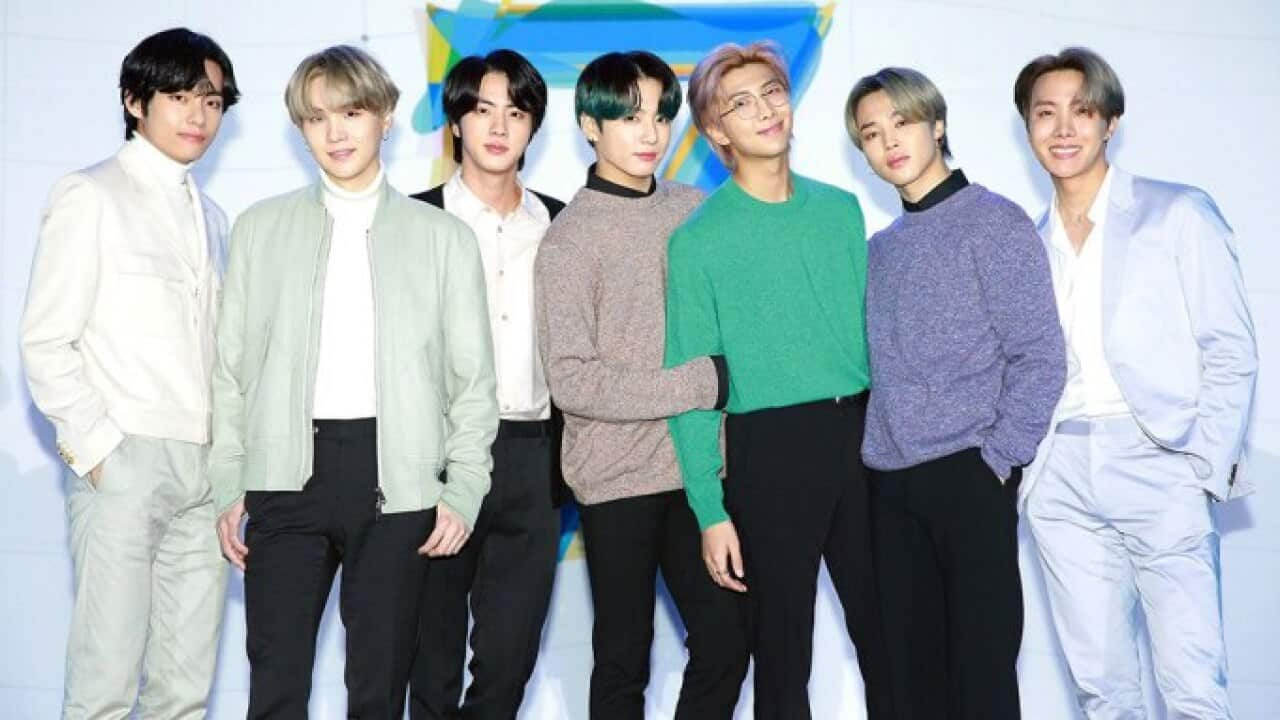Key Points
- Boyband BTS has announced its members will undertake mandatory military service.
- The lead-up is a reminder of the political support of the K-Pop genre.
K-Pop superstars BTS will soon be stepping away from the spotlight to enlist in South Korea's mandatory military service.
The news was confirmed by the band's agents, BigHit Music, on Monday in a statement, bringing an end to months of discussion over whether the international giants could be exempted from service due to their contribution to the country’s economy.
Conscription has been mandatory in South Korea since 1957, with all able-bodied men expected to complete between 18 to 21 months before they turn 28.
Exceptions can be given to athletes, actors, directors and classical musicians who have made a significant international impact but currently, decorated pop celebrities are not included.
Until now, all seven BTS members were given leniency to put this off until they turned 30. The oldest member, known as Jin, is 29.

South Korean K-pop group BTS performs during a Korean cultural event as part of the South Korean president's official visit to France in 2018. Source: Getty / YOAN VALAT/AFP
In September, one politician proposed that pop stars who received awards from the government, such as the Order of Cultural Merit given to BTS by former president Moon Jae-In in 2018, should unlock the option for stars to serve an alternative form of military service.
The decision of an exemption was still being weighed up when the surprise announcement was made.
Despite petitioning from fans, BTS members themselves had not demanded an exemption. In previous press conferences, they said that they will comply with the nation's calling any time, as it is a duty.
The soft power the group holds is visible in the significant success they've had abroad. Research from the Hyundai Research Institute confirmed that BTS - just one group in the K-Pop genre - had become a global economic force. In 2018, the Institute found BTS was contributing more than $3.6 billion to the South Korean economy every year.
Despite the band's decision to undertake the service, the discussion has highlighted the unique relationship between the South Korean government and the K-Pop industry.
A mutually beneficial relationship
The rise of K-Pop and BTS wasn't an accident.
The K-Pop industry, or rather South Korea's cultural sector, received a notable push in the 1990s when Asia went through a financial crisis.
At the time, leaders of the country decided to use music to improve its image and increase its international pull. The government consequently poured millions of dollars into the establishment of a Ministry of Culture which backed the film, television and music industries. An entire department was dedicated to K-Pop.
Dr Sarah Keith, a senior lecturer in media and music at Macquarie University in Sydney who has researched Korean popular culture, told The Feed the K-Pop industry and government have had a close, mutually supportive relationship since this time.

Members of the South Korean pop group BTS speak at the daily press briefing at the White House in May 2022 after meeting with US President Joe Biden to discuss Asian inclusion and representation. Credit: Kent Nishimura/Los Angeles Times
"The government and the popular culture industries have found ways in which they can mutually support each other. The best example of this is the prominence of (K-Pop) idols in tourism campaigns," she said.
"It's why we have the 'K' in K-Pop because it's kind of like a nation branding strategy, we can immediately identify where it comes from.
"K-Pop serves as this wonderful, soft power mechanism to get people thinking differently about Korea as an advanced economy and society."
She said the situation presents a unique overlap between pop stars and the government, where the stars or 'idols' are now ambassadors for the country on a global stage.
"Any kind of popular culture has to portray good messages ... that's the kind of unique Korean angle which I think has nurtured this very strong music industry, but also one that is really aligned to state interests," Dr Keith said.
"Whereas the American music industry is much more free-form, there's really no government link to the music industry - it's very grassroots."
She adds that stars are intentionally "scandal-free" and "clean-cut".
"They need to be they need to represent the best of youth, so idols will be hard working, they will have impeccable conduct."
Public engagement also shows that many stars frequent the president's residence, the Blue House, as well as diplomatic events.
Dr Keith said in many ways, she's not surprised BTS are carrying out their military service, having built a career on being "relatable, vulnerable and not out of touch".
"It's not just pop music, but it's a major, highly valued diplomatic asset," she said.
"I cynically wonder whether this kind of uncertainty might have been a bit of a publicity strategy."










